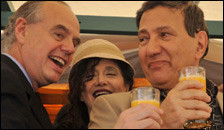
William: Hello and welcome to The English We Speak. My name is William Kremer.
威廉:大家好,歡迎收聽地道英語節(jié)目。我是威廉·克萊默。
Helen: And I'm Helen. Hello.
海倫:我是海倫。大家好。
William: So, are you going to go out after work tonight, Helen?
威廉:海倫,今晚下班后你要出去玩嗎?
Helen: You mean for Rob's birthday? What's the plan?
海倫:你是說為羅布慶祝生日嗎?有什么計劃嗎?
William: Well, I think we're just going to head to the Fox and Flowerpot at 6.00pm.
威廉:嗯,我想我們晚上六點要去Fox and Flowerpot酒吧。
Helen: Going to the pub again? No, I think I'll give it a miss this time.
海倫:又要去酒吧?我想這次我就不參加了。
William: Oh no! Why? Have you got plans?
威廉:哦不!為什么呀?你有其他計劃嗎?
Helen: No, it's just...
海倫:沒有,只是……
William: You don't like Rob, maybe?
威廉:也許是你不喜歡羅布?
Helen: No, no–that's not the reason. I just don't like going to the pub all the time. I don't really drink, you know, and I always feel a bit awkward.
海倫:不,當(dāng)然不是,那并不是我不去的原因。我只是不喜歡總是去酒吧。我不喜歡喝酒,你知道,我經(jīng)常會覺得有點尷尬。
William: Ah, I didn't know you were teetotal, Helen!
威廉:啊,海倫,我不知道你滴酒不沾!
Helen: Teetotal?
海倫:Teetotal?
William: Teetotal. This is an adjective that describes a person who doesn't drink alcohol.
威廉:這是一個形容詞,用來描述不喝酒的人。
Helen: Right-so does this person just drink tea?!
海倫:好的,那這類人只喝茶嗎?
William: Well maybe! But actually, the word teetotal doesn't have anything to do with tea. It's spelled T.E.E.T.O.T.A.L. Let's listen to this example of the word being used:
威廉:也許吧!不過實際上,這個詞和茶沒有任何關(guān)系。拼寫是T.E.E.T.O.T.A.L。我們來聽一下應(yīng)用這個詞的例子:
Man: Have you bought the drinks for the party yet?
男:你買好宴會要用的酒了嗎?
Woman: Yep–I've got a case of wine and two boxes of beer. I've also got some soft drinks for Granny. She's teetotal nowadays.
女:買好了,我買了一箱紅酒和兩瓶啤酒。我還給奶奶買了些軟飲料。她現(xiàn)在滴酒不沾。
Helen: Can you say, "I don't feel like drinking beer tonight... I'm going to have a teetotal evening"?
海倫:可以說“我今晚不想喝啤酒……我今晚打算滴酒不沾”嗎
William: Well not really. We describe people as teetotal, and it means that they never drink alcohol. Now, teetotal is an adjective, but there is also a noun that we can use. See if you can hear it in this example:
威廉:不可以。我們形容一個人滴酒不沾,意思是他們從來不喝酒精類飲料。現(xiàn)在這個詞是個形容詞,不過也可以用作名詞。就像你在下面這個例子中聽到的一樣:
Man: My father used to drink heavily, you know. Every night he'd have a bottle of Scotch. Maybe that's why I've always been a teetotaller.
男:你知道,我爸爸以前酗酒很嚴(yán)重。他每晚都要喝一瓶蘇格蘭威士忌。也許這就是我成為禁酒主義者的原因。
Helen: I heard the word teetotaller. And the speaker in that clip was describing why he was a teetotaller. Now William, where does this word come from?
海倫:我聽到了teetotaller這個詞。剛才那名說話者解釋了他成為禁酒主義者的原因。可是威廉,這個詞來源于哪里呢?
William: Well no-one is really sure, Helen. But it's worth saying that in the past it was used to describe someone who didn't drink and who also thought that drinking alcohol was a bad thing. I think nowadays it's a little bit softer.
威廉:其實沒有人清楚,海倫。不過值得一提的是,過去這個詞用來形容不喝酒的人,而且這些人認(rèn)為喝酒是不好的事情。我想現(xiàn)在這個詞比較柔和了。
Helen: Well, truth be told William, I'm not a teetotaller. I like a drink every now and then but I just can't drink pint after pint of beer like you English people!
海倫:嗯,威廉,說實話,我不是禁酒主義者。我喜歡偶爾喝點酒,不過我不能像你們英國人一樣一杯接一杯地喝!
William: Well, good for you Helen! But why don't you come to the pub anyway? You can just have an orange juice or a lemonade. No-one will laugh at you.
威廉:海倫,你做得對!不過為什么你不能去酒吧?你可以喝橙汁或是檸檬汽水。沒有人會笑話你的。
Helen: No, they won't laugh at me, but they will ask me to drive them home! No, please tell Rob happy birthday but I don't feel like it tonight. But thanks for telling us about this interesting word, William.
海倫:對,他們不會笑話我,但是他們會讓我開車送他們回家!請?zhí)嫖肄D(zhuǎn)達(dá)羅布祝他生日快樂,不過我今晚不想喝酒。威廉,謝謝你告訴我們這個有趣的詞。
William: Well, don't mention it, Helen. Right, I'm off to the pub now.
威廉:海倫,不客氣。好,我現(xiàn)在要出發(fā)去酒吧了。
Helen: Don't drink too much!
海倫:別喝太多酒!
William: I won't! Bye!
威廉:不會的!再見!
Helen: Bye!
海倫:再見!











